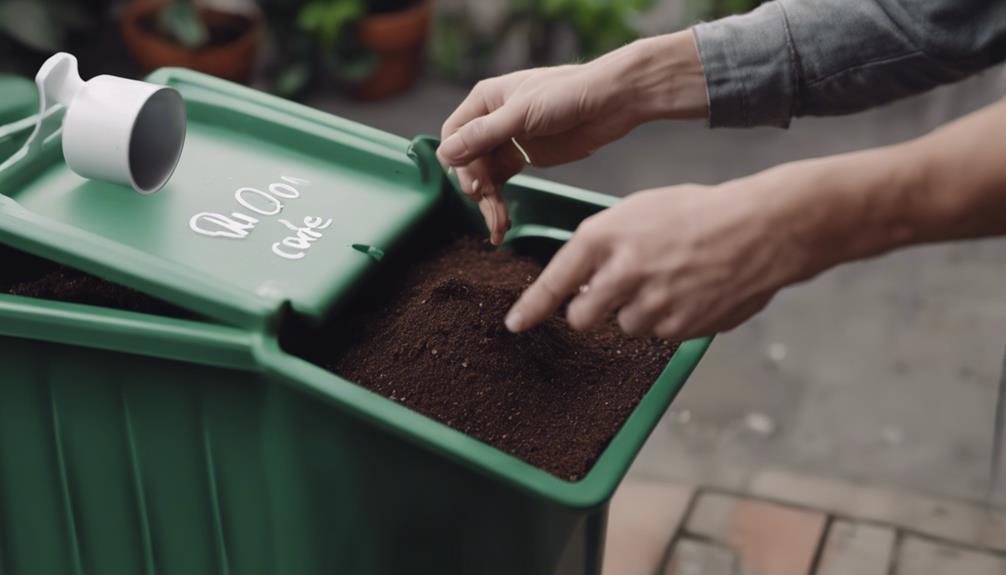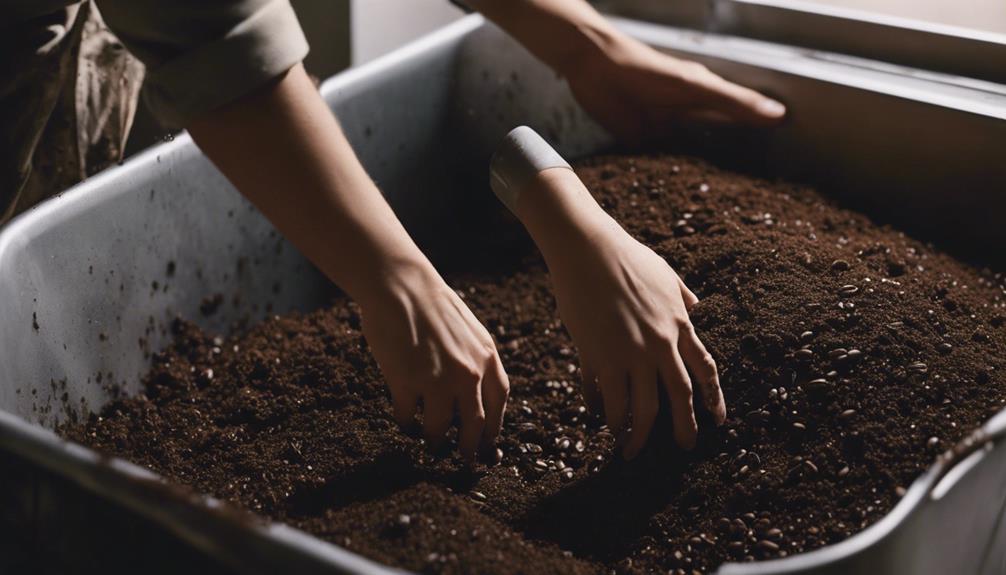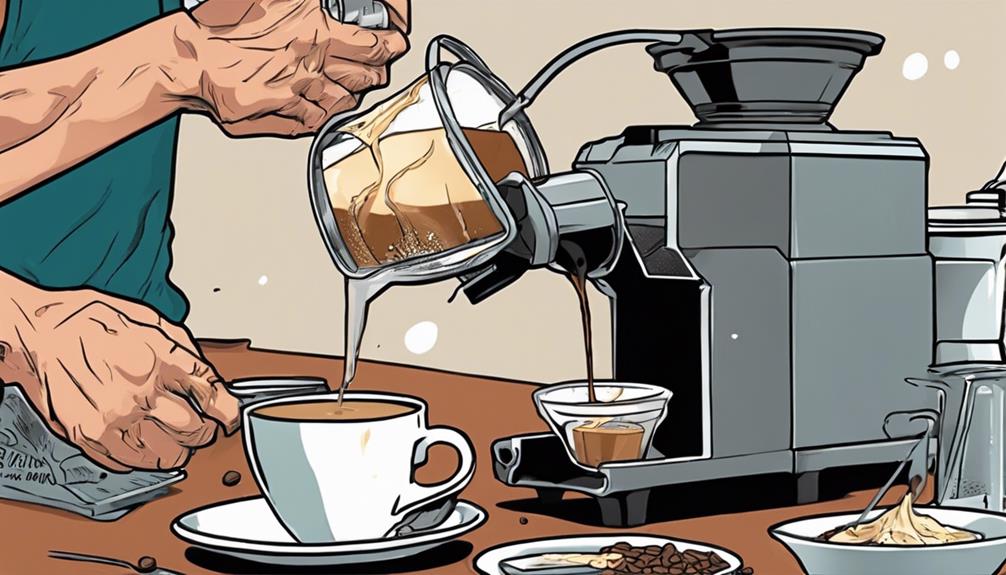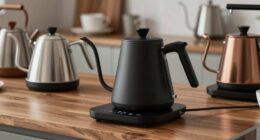To avoid clogging drains with coffee grounds, refrain from disposing them down the sink. Instead, throw them in a designated trash bin or consider composting for environmentally friendly alternatives. When cleaning coffee machine components, make sure to regularly flush drains to prevent buildup. Use paper or mesh filters to catch small particles and oils. Avoid mixing grounds with grease in sinks. DIY methods such as pouring boiling water or using a mixture of baking soda and vinegar can be helpful in unclogging drains. For tough blockages, try snaking or plunging the drains. To prevent plumbing issues, seek advice from a professional plumber. It is crucial to properly maintain and take care of drains to prevent future problems associated with coffee grounds.
Key Takeaways
- Use a paper or mesh filter to trap grounds.
- Dispose of grounds in the trash, not the sink.
- Regularly clean drains to prevent buildup.
- Avoid pouring hot coffee down the drain.
- Consider composting coffee grounds for eco-friendly disposal.
Proper Disposal Methods
To prevent drain blockages and plumbing issues, avoid disposing coffee grounds down the sink. Improperly disposing of coffee grounds can lead to clogged drains and costly repairs. Instead, consider using a designated trash bin for your coffee grounds or explore composting them as environmentally friendly disposal methods.
By taking these simple steps, you can help maintain the smooth operation of your drainage system and avoid potential blockages caused by coffee grounds accumulating in your pipes.
It is essential to remember that even when washing parts of your coffee machine in the sink, you should regularly flush the drains to prevent buildup. Additionally, when dealing with filters, make sure to properly dispose of used ones and clean reusable filters regularly to prevent clogs.
Ensuring that coffee grounds and filters don't enter the drain system will considerably reduce the risk of blockages and keep your plumbing in good working order. By following these proper disposal methods, you can enjoy your coffee without worrying about potential plumbing issues.
Use of Coffee Filters
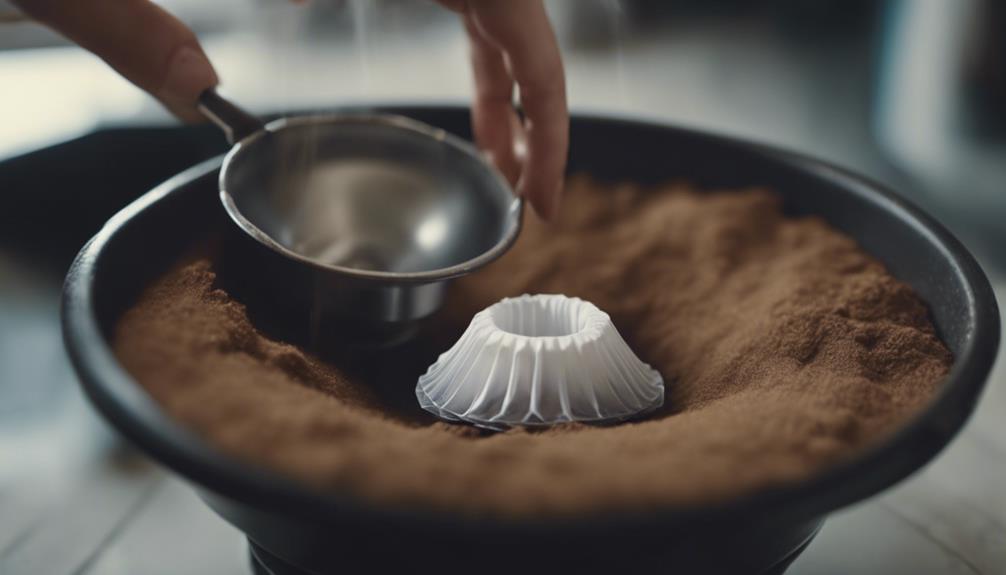
Coffee filters come in various sizes and materials, with each serving a distinct purpose. Understanding the significance of filter size can help prevent coffee grounds from clogging drains.
Proper disposal methods of used filters are essential to maintain plumbing systems, and considering the environmental impact of your filter choice is also paramount.
Filter Size Importance
Consider using a paper or mesh coffee filter to effectively prevent fine particles and oils from clogging your drains. The size of the filter plays an important role in ensuring that coffee grounds are adequately contained during the brewing process.
Opting for a filter with a mesh design can greatly reduce the risk of drain blockages by capturing even the smallest particles that could otherwise pass through. Reusable filters with a mesh structure are particularly useful as they can be washed and reused, providing a sustainable solution while maintaining their effectiveness in preventing grounds from entering your plumbing system.
Proper Disposal Methods
How can coffee filters assist in the proper disposal of coffee grounds to prevent drain blockages?
Coffee filters are a simple yet effective tool in managing coffee grounds and keeping your drains clear. Here are a few ways they can help:
- Containment: Use a coffee filter to trap and hold the coffee grounds before disposing of them. This prevents the grounds from entering the drains and causing blockages.
- Easy Disposal: Place a coffee filter over the drain and pour the used grounds through it. Once filled, twist the filter shut for convenient and mess-free disposal without risking drain clogs.
- Retaining Grounds: Coffee filters not only aid in proper disposal but also help in retaining the grounds for composting, discarding in the trash, or reuse in various ways, preventing any issues with the drains.
Environmental Impact Consideration
When evaluating the environmental impact of using coffee filters, it's important to take into account their biodegradability and reusability to minimize waste.
Paper filters, commonly used in drip coffee makers, offer the advantage of quick biodegradation in compost, reducing their environmental impact significantly. By choosing paper filters over non-biodegradable options, you contribute to sustainable waste management practices.
On the other hand, reusable filters, typically made of mesh, provide a more eco-friendly alternative by reducing the generation of waste. These filters can be rinsed and used multiple times, effectively minimizing the environmental footprint associated with single-use paper filters.
Opting for reusable filters not only helps in waste reduction but also prevents coffee grounds from entering plumbing systems, reducing the risk of drain blockages.
Proper disposal of used filters, whether paper or reusable, is essential to maintain the integrity of plumbing systems and mitigate environmental harm caused by clogs and blockages.
Avoid Sink Disposal
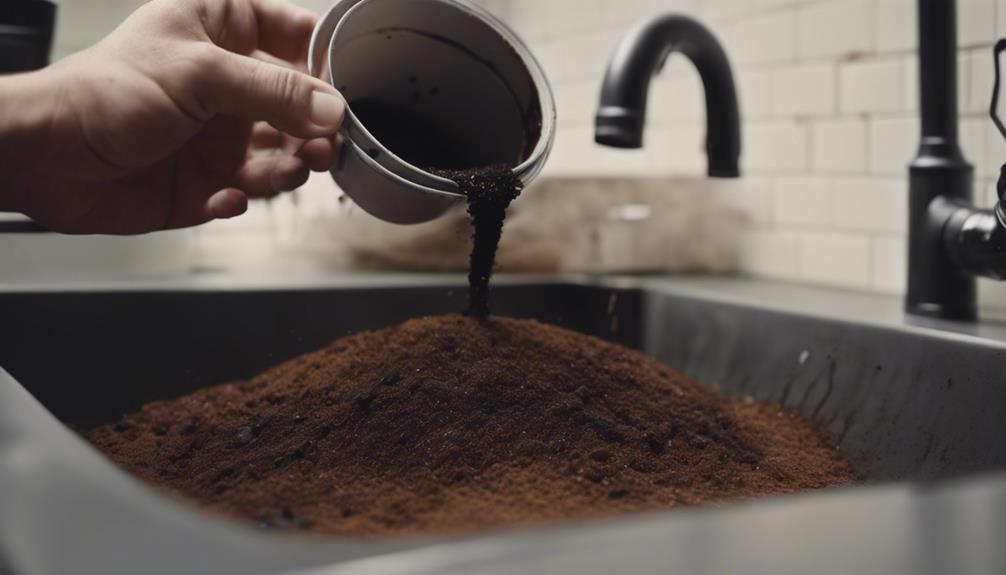
To prevent drain blockages, avoid disposing of coffee grounds down the sink. Flushing coffee grounds down the sink can lead to plumbing system issues and clogged drains. Instead, opt for proper disposal methods such as using a designated trash bin or composting the coffee grounds.
Here are some key points worth noting:
- Sink Damage: Coffee grounds can accumulate in the sink pipes, causing blockages and potential damage to the plumbing system.
- Clog Formation: When coffee grounds mix with grease or other substances in the pipes, they can form clogs that are difficult to remove.
- Odor Concerns: Decomposing coffee grounds in the drains can create unpleasant odors and attract pests.
Shake Grounds Into Trash
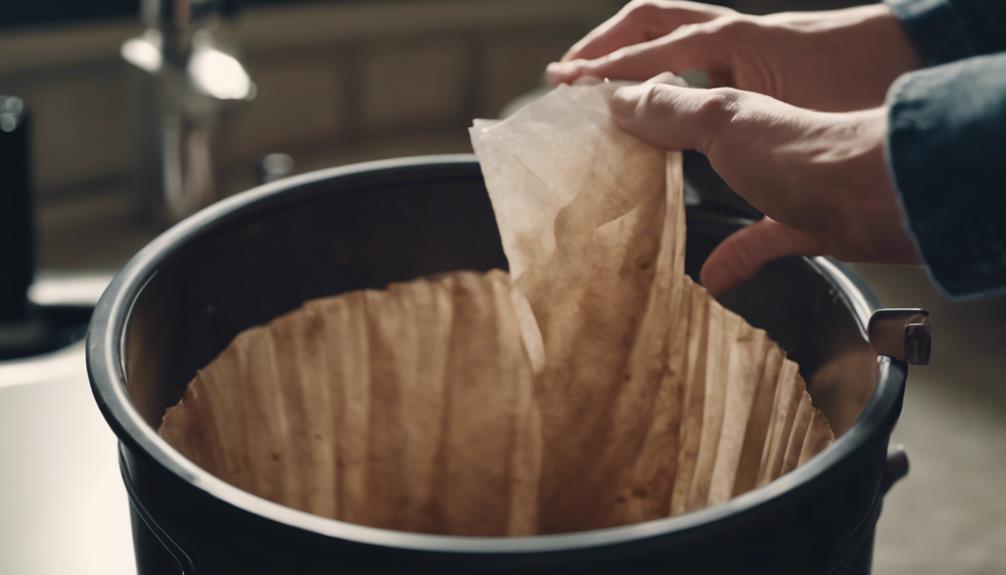
Shaking coffee grounds into the trash is a simple yet effective method to prevent drain blockages. When you dispose of coffee grounds by shaking them into the trash instead of rinsing them down the sink, you greatly reduce the risk of clogged drains.
By directly depositing the grounds into the trash, you avoid potential plumbing issues that can arise from using the sink as a disposal for coffee grounds. This straightforward approach not only maintains clear drains but also helps in preventing blockages that can result from improperly disposing of coffee grounds.
Properly shaking the grounds into the trash is a quick and efficient way to make sure that your drains remain free from clogs. Remember, a little effort in disposing of coffee grounds correctly can go a long way in preventing the headache of dealing with clogged drains in the future.
DIY Unclogging Methods
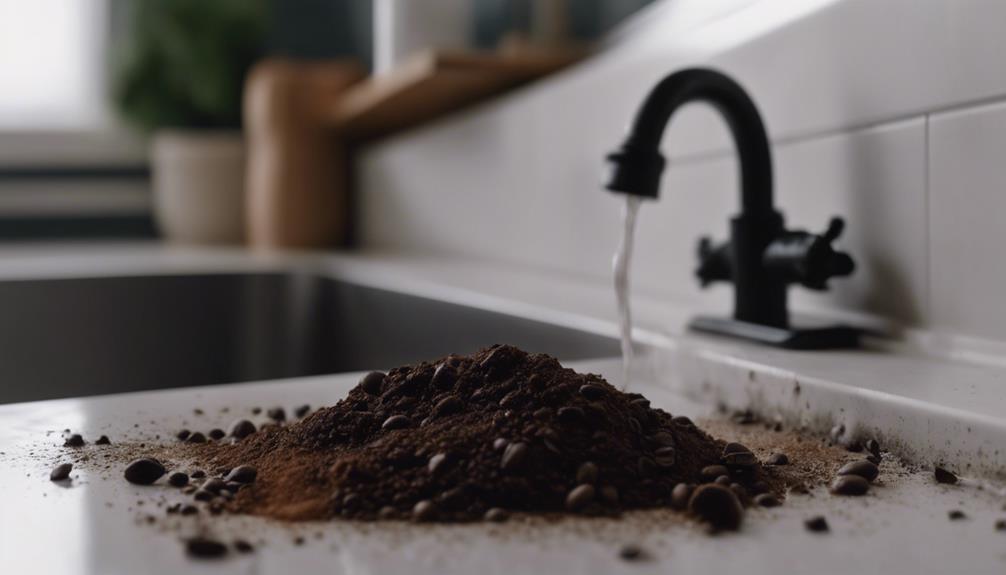
To effectively address clogs caused by coffee grounds in your drains, consider safe drain cleaning methods and natural clog removers.
Boiling water can help break down and flush away coffee grounds, while a sink plunger can dislodge blockages.
Additionally, a mixture of baking soda and vinegar can dissolve clogs, and using a plumbing snake can physically remove compacted grounds.
Safe Drain Cleaning
Using common household ingredients like baking soda and vinegar can effectively unclog drains and prevent coffee grounds from causing blockages. To keep your sink drain flowing smoothly and avoid issues with your garbage disposal, it's important to regularly clean and maintain your plumbing system.
Here are some safe drain cleaning tips to help you prevent coffee grounds from blocking your drains: To prevent coffee grounds from clogging your drains, make sure to use a fine mesh strainer to catch any large particles before they go down the drain. Additionally, try mixing a tablespoon of baking soda with a cup of vinegar and pouring it down the drain to help break down any remaining coffee residues. Lastly, safely dispose of coffee granules by composting them or throwing them in the trash to prevent them from causing future blockages.
- Use a drain strainer: Install a drain strainer to catch coffee grounds and other debris before they enter the drain, reducing the risk of clogs.
- Avoid pouring hot coffee down the drain: Hot coffee can contribute to clogs over time by solidifying grease and other substances in the pipes.
- Dispose of coffee grounds properly: Instead of washing coffee grounds down the drain, dispose of them in the trash or use them for beneficial purposes like composting to prevent drain blockages.
Natural Clog Removers
Boiling water can effectively dissolve coffee grounds and clear minor blockages in drains. The heat from boiling water helps break down the coffee grounds, allowing them to move through the pipes more easily and prevent clogs.
Another natural method to unclog drains is by using a mixture of baking soda and vinegar. When combined, these two ingredients create a fizzy reaction that can help break down the coffee grounds and clear the blockage.
Additionally, utilizing a sink plunger can dislodge coffee grounds stuck in the drain, improving water flow and preventing future clogs.
For more stubborn blockages, manual pipe cleaning with a drain snake or auger can physically remove the coffee grounds causing the issue.
Remember, coffee grounds can contribute to clogging your drains, so it's essential to dispose of them properly and regularly manually clean your pipes to avoid blockages in the future.
Snaking the Drain
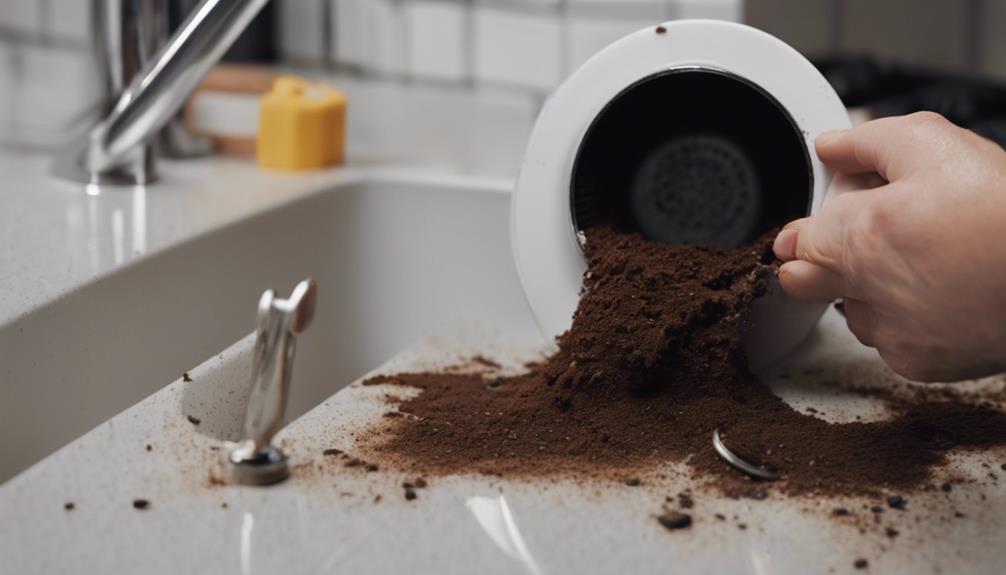
One effective method for clearing coffee grounds from drains is by utilizing a drain snake to break up and remove blockages.
When it comes to snaking the drain, consider the following:
- Flexible Tool: A drain snake is a flexible plumbing tool designed to navigate through pipes and dislodge clogs effectively.
- Blockage Removal: Drain snakes are adept at breaking up and removing coffee grounds that may be obstructing the water flow in your pipes.
- Preventive Maintenance: Snaking the drain not only clears existing blockages but also helps in maintaining a smooth pathway for water to flow freely, reducing the likelihood of future clogs.
Plunging Technique
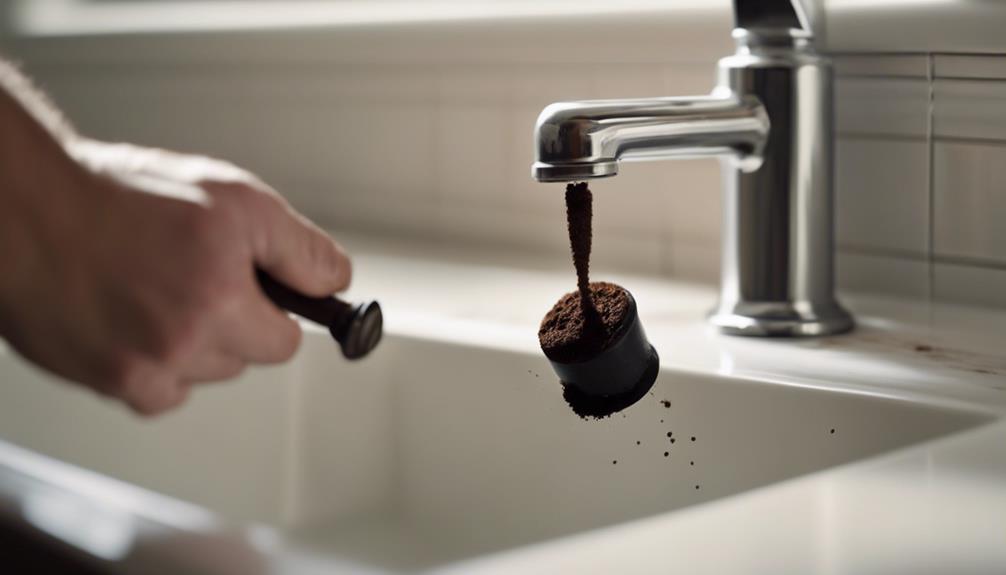
To effectively clear coffee grounds from drains, utilizing the plunging technique with a sink plunger is a practical method for dislodging blockages. When using a sink plunger, make sure it has a flat bottom to create a strong seal over the drain. Apply quick and vigorous plunges to generate pressure that can dislodge clogs caused by coffee grounds in your pipes. The repeated plunging motion helps break up the blockage, allowing the grounds to move through the pipes more easily.
To enhance the effectiveness of the plunging technique, ensure the plunger's flange fits securely around the drain opening. This seal increases the pressure applied to the blockage, aiding in its removal. Remember to slowly release the pressure on the plunger to prevent splashing and allow water to flow freely through the cleared pipes.
| Plunging Technique Steps |
|---|
| 1. Create a strong seal with the sink plunger. |
| 2. Apply quick and vigorous plunges. |
| 3. Repeat plunging motion to dislodge coffee grounds. |
Coffee Grounds and Drain Blockage
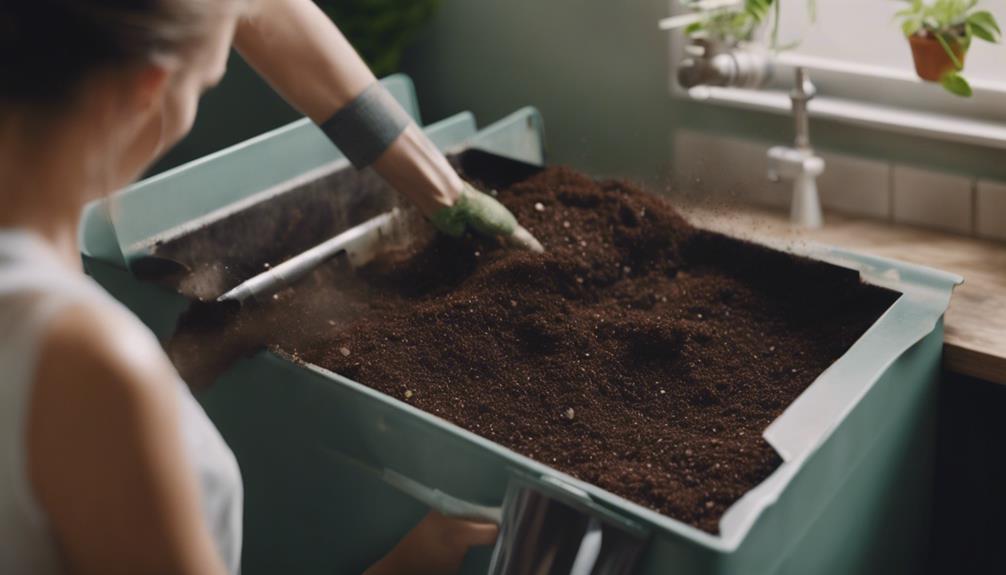
Properly disposing of coffee grounds is essential in preventing drain blockages caused by their accumulation and propensity for sticking in pipes. When dealing with coffee grounds and drain blockage, it's important to understand the potential plumbing issues that can arise from improper disposal methods.
Here are some key points to keep in mind:
- Accumulation: Coffee grounds can build up in drains over time, leading to blockages.
- Sticking: Due to their texture and buoyancy, coffee grounds have a tendency to adhere to the inner walls of pipes, contributing to clogs.
- Plumbing Problems: Flushing coffee grounds down the sink can result in plumbing issues and drain blockages, requiring costly repairs.
To avoid these issues, make sure to dispose of coffee grounds properly by using a designated trash bin or composting them. By adopting these practices and refraining from pouring coffee grounds down the sink, you can help maintain clear drains and prevent potential plumbing headaches.
Other Items to Avoid Flushing
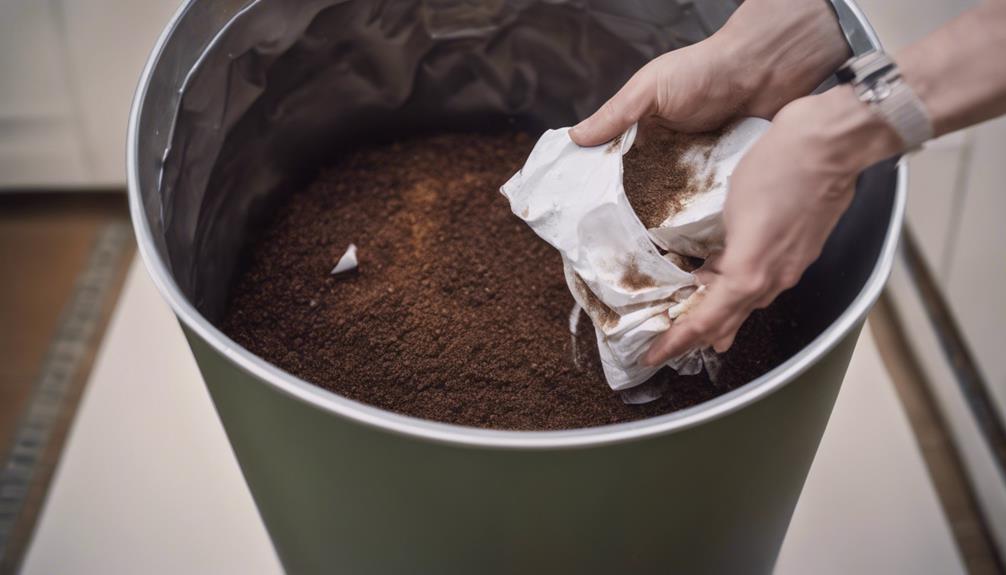
Avoid flushing certain items like cooking oil, fats, grease, and fibrous foods down the drain to prevent blockages in your plumbing system. Cooking oil, fats, and grease can solidify in pipes, leading to clogs. Similarly, fibrous foods like eggshells, pasta, rice, and others can tangle and obstruct the flow of water.
It's essential to refrain from disposing of coffee grounds, paper towels, cotton balls, or personal hygiene products in sinks to avoid potential plumbing issues. Additionally, items such as hair, dental floss, and wet wipes should be thrown in the trash rather than being flushed down the drain to prevent further complications.
Remember that substances like paint, chemicals, medications, and cigarette butts must never be poured into sinks as they can harm the environment and damage plumbing systems. In case you encounter severe blockages or issues caused by flushing inappropriate items down the drain, it's advisable to call a professional plumber who can help remove these substances effectively and prevent future complications.
Professional Plumber Consultation
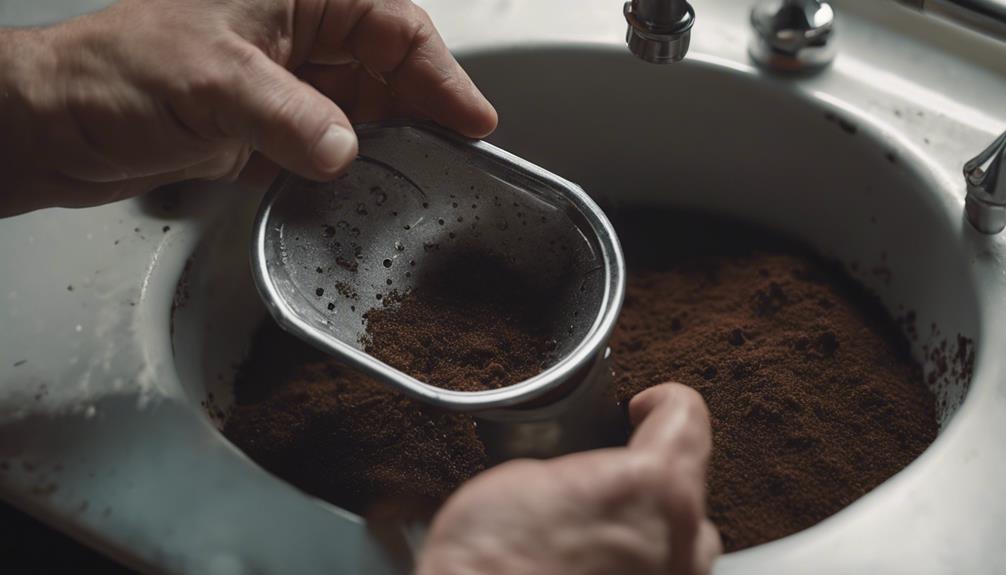
When facing issues with coffee grounds clogging your drains, consulting a professional plumber is essential. Their expertise can offer valuable tips on preventing blockages and maintaining the health of your drains.
Plumber's Expertise Tips
Plumbers strongly advise against pouring coffee grounds down the drain to prevent potential blockages. These grounds can accumulate in the pipes, leading to clogs that may hinder water flow and cause damage to the plumbing system. To maintain the health of your water lines, it's important to follow expert advice on proper disposal methods for coffee grounds.
Here are some essential tips from professional plumbers to help you avoid common issues:
- Flush Coffee Grounds: Instead of rinsing coffee grounds down the sink, consider flushing them down the toilet or disposing of them in the trash to prevent blockages.
- Seek Professional Help: If you encounter persistent drain problems due to coffee grounds, don't hesitate to seek assistance from a professional plumber to address the issue efficiently.
- Regular Maintenance: Regularly clean and maintain your drains to prevent coffee grounds and other debris from causing plumbing issues in the future.
Drain Maintenance Advice
Regularly consulting with a professional plumber can provide valuable insights on maintaining your drains to prevent coffee grounds from causing blockages. A professional plumbing team possesses the expertise to assess your plumbing system's condition and identify potential issues related to coffee grounds accumulation.
By seeking their advice, you can learn proper drain maintenance techniques to avoid coffee grounds clogging your pipes. These experts can offer tailored drain maintenance advice, helping you understand the detrimental effects of coffee grounds on your plumbing system and suggesting preventive measures to keep your drains clear and efficient.
Professional consultation guarantees that your plumbing remains in top-notch condition, free from blockages caused by coffee grounds. By following the guidance of a professional plumber, you can proactively address any concerns related to coffee grounds and maintain the smooth operation of your drainage system.
Frequently Asked Questions
What Dissolves Coffee Grounds in the Drain?
Boiling water effectively dissolves coffee grounds in the drain.
Combining baking soda and vinegar can also break down the grounds.
Enzyme-based commercial drain cleaners are another option for dissolving coffee grounds.
Mechanical methods such as drain snakes and plungers can help dislodge and remove the residue.
Regular maintenance and preventive measures are essential in preventing the accumulation of coffee grounds that could lead to drain blockages.
Will Small Amounts of Coffee Grounds Clog Drain?
Small amounts of coffee grounds can indeed clog drains. They've a tendency to clump together and accumulate over time, leading to blockages in pipes.
Even a small quantity of grounds can cause plumbing issues. It's vital to prevent coffee grounds from entering drains to avoid potential clogs and costly repairs.
Regularly disposing of them in the sink can contribute to drain blockages, making it imperative to find alternative disposal methods.
Will Coffee Grounds Clog the Shower Drain?
Coffee grounds pose a real threat to your shower drain's well-being. These small particles can band together, creating a stubborn clog over time.
To prevent this drain disaster, refrain from pouring coffee grounds down the drain. Opt for composting or trash disposal instead.
Keeping your drain clear of these grounds through regular maintenance is key to smooth water flow. Remember, a happy shower drain means a happy you!
How to Get Rid of Coffee Grounds?
To properly dispose of coffee grounds, you should avoid pouring them down the sink as it can lead to potential plumbing issues. Instead, toss them in the trash or compost bin.
Consider using a drain strainer to catch any stray grounds and prevent them from entering the drain. Remember to also dispose of used filters correctly to prevent build-up in the plumbing system.
Regularly cleaning reusable filters will help avoid contributing to drain blockages.
Conclusion
To prevent coffee grounds from blocking drains, remember to dispose of them properly. Avoid using the sink and consider DIY unclogging methods if needed.
Did you know that coffee grounds are one of the most common causes of drain blockages in households? By following these simple tips, you can help keep your drains clear and avoid costly plumbing issues in the future.
